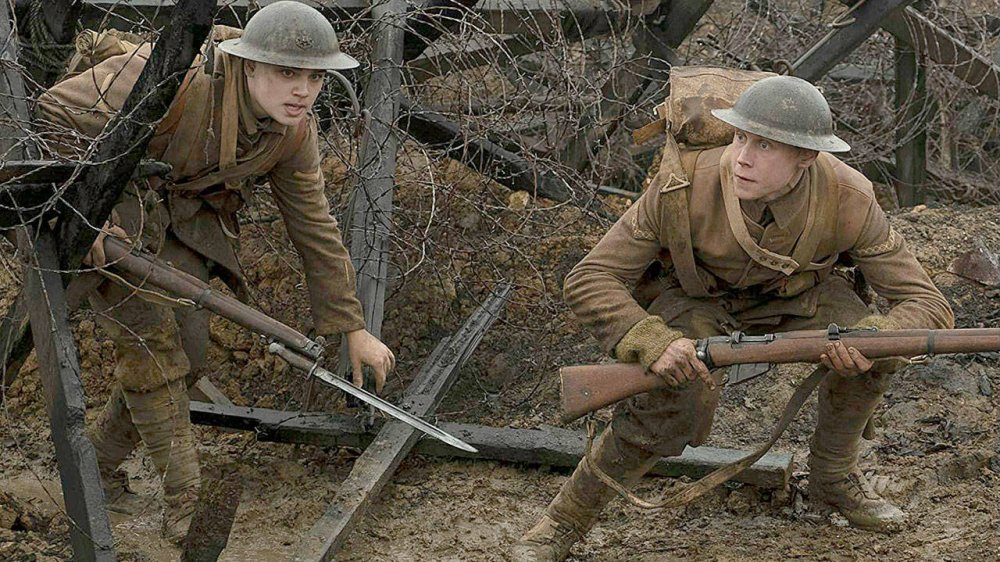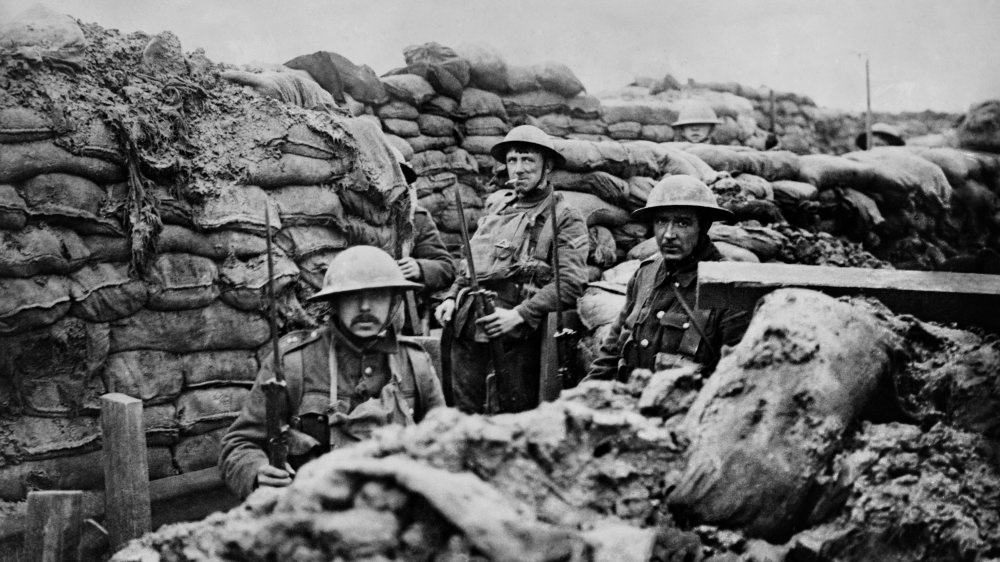Is 1917 Based On A True Story?
Sam Mendes' war epic 1917 is finally available to stream and rent. You might have heard that the film was constructed to look like it was filmed in long, continuous takes, but what you may not know is that the 1917 is somewhat based on real events in the First World War. The Golden Globe-winning film is not a true story, but it's pretty grounded in reality, as far as historical fiction gets.
The film, which also won big at the Oscars, takes place in the spring of the titular year, and centers around two British soldiers on the Western Front in France who are tasked with crossing enemy lines to deliver a message to the nearby Devonshire Regiment. The message is to stop a scheduled attack on the Germans, who have seemingly retreated, because it leads into a trap. Unlike those of other war films, like Dunkirk, Valkyrie, and Hacksaw Ridge, the plot here is fictional, and no historical figures are depicted. That said, here's what was actually happening at that time, how it compares to the film, and the one real person who inspired Mendes to tell this story.
The status of World War I in 1917
Let's start with the basics: World War I lasted from 1914 to 1918, so the period depicted in the film was in the latter half of the conflict. The Devonshire Regiment was real, and was nicknamed "The Devons," as they are in the film. The Hindenburg Line, a.k.a. the new defensive position in which the Germans were situated at that time after a planned withdrawal, was really built between the winter of 1916 and the spring of 1917. Finally, Écoust-Saint-Mein, the village where Schofield is knocked out and finds refuge with a local woman hiding from German soldiers in the film, would have seen fighting during the Battle of Arras, which began on April 9, 1917.
The German army had the strategic upper hand at this point of the war, and the Franco-British troops suffered major losses as they attempted to break the Hindenburg Line. This was primarily the purpose of the Nivelle Offensive, an operation that took place between April and May of 1917, was deemed a failure by history, and actually led to a lot of mutinies in the French army. It makes sense that even the British armies were feeling disillusioned three years into the war, as we see is the case with Andrew Scott's character in 1917.
How Sam Mendes' grandfather inspired the film
At the end of 1917, there's a dedication to the director's grandfather, Alfred Mendes, who most directly inspired the film. "He was very young, and small and very fast. He was given the job of carrying messages on the Western front," Mendes told Deadline, explaining that the film is loosely based on his grandfather's anecdotes. "The characters George MacKay and Dean-Charles Chapman play are not my grandfather. But the spirit of what he told me and the central idea of a man carrying a message wouldn't leave me. It just clung on in there somehow, for the last 50 years." In an interview with NPR, Mendes described one particular story his grandfather told in more detail about how he was chosen to deliver a message across No Man's Land because he was so short he was completely covered by the six feet of mist on the ground. That evocative image stuck with the future filmmaker.
Alfred Mendes was not only grandfather to a Tony award-winning director who brought us two James Bond films; he was actually a writer who published several short stories, a literary magazine, two novels titled Pitch Lake and Black Fauns, and The Autobiography of Alfred H. Mendes, which touches on his war experiences. In the book, he wrote out the citation he received with the British army's Military Medal: "It was largely due to his coolness and his complete disregard for his personal safety that his commanding officer was kept informed of the state of affairs on that important flank. His activity and untiring energy under the worst possible conditions of ground and weather are remarkable." That sounds a lot like Schofield, doesn't it?
So, using fiction that's grounded in a bleak reality, 1917 portrays what a small victory would feel like during that time of defeat, and manages to honor Mendes' grandfather at the same time.


